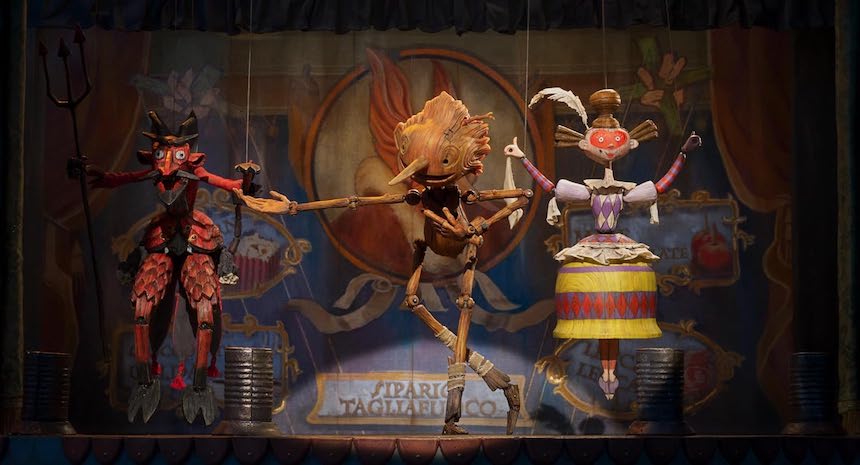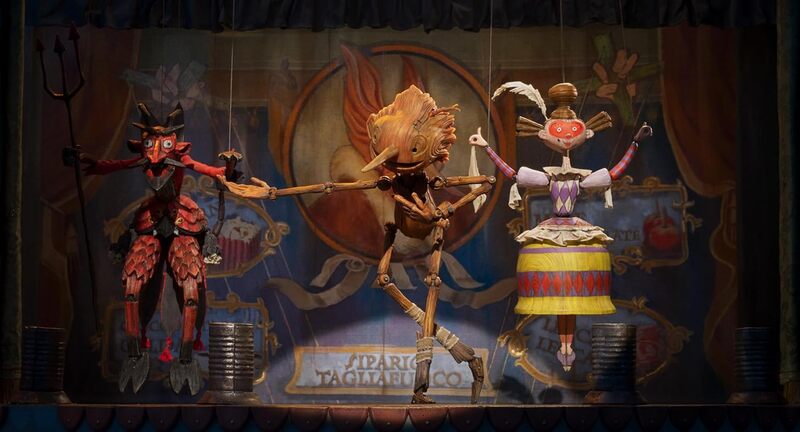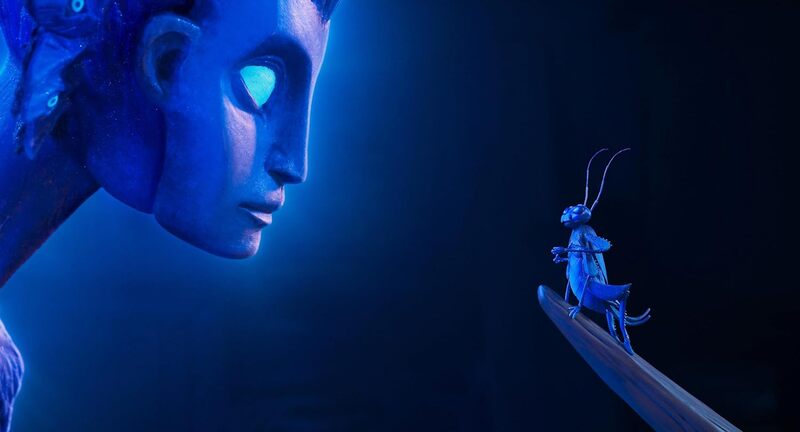GUILLERMO DEL TORO'S PINOCCHIO 4K Review: An Honest to Goodness Great Film
Ewan McGregor, Gregory Mann, Tilda Swinton, David Bradley, and Christoph Waltz star in the award-winning stop-motion take on the dark fairy tale.

“You must try your best, and that’s the best that anyone can do.”
Guillermo del Toro’s 2022 Netflix-backed reinterpretation of Carlo Collodi’s dark morality tale of childhood and parenthood via the misadventures of a living wooden puppet racked up lots of hugs in last year’s various “Best Animated Feature” award races, but no one is complaining about the splinters.
Indeed, it went on be one of the very rare stop-motion films to win the Academy Award for Best Animated Feature. Not to be confused with the hollow Tom Hanks-led Disney revision put forth by Robert Zemeckis earlier that year, this greatly rewatchable musical version is a deeply felt fable for the ages.
Mel Valentin’s ScreenAnarchy review of the theatrical release stated, “del Toro’s iteration, co-directed with Mark Gustafson (Fantastic Mr. Fox)… is nothing less than the work of an auteur working with the best available talent to turn his decades-long dream of making a stop-motion adaptation of Pinocchio.” To be clear, this is no children’s story of feelgood empowerment, saccharine aesthetics, garish saturation, and sassy attitude. Much of Pinocchio echoes aspects of del Toro’s previous personal works in terms of their conflation of the supernatural and the worst aspects of humanity in wartime.
When an imposing Italian fascist officer asks Pinocchio, “Who controls you, wooden boy?,” the wooden boy defiantly fires back, “Who controls YOU?” His aging father, Geppetto (cantankerously voiced by David Bradley) the lonesome woodcarver who created him in a fit of drunken mourning over his own dead son, understandably moves to restrain his strange impetuous son for fear of authoritarian retribution. For viewers, however, it undeniably is a small but cheer-worthy moment that paves the way for the rest of the film and makes quite clear that this story isn’t afraid to have a pertinent voice.
Even the eight original songs aren’t afraid to get real in this manner. “We were king once… can we be king twice?” is sung by the devious carnival lord Count Volpe and performed by his voice actor, Christoph Waltz. It’s a song about the addiction and allure of power, one that’s currently being sung by Trump followers throughout the U.S. in this most frightening election year. Volpe doesn’t make, he only takes. But of course, he too is a puppet…
In a new video conversation exclusive to this Criterion disc release, del Toro reflects on the film’s greater themes. He tells critic Farran Smith Nehme: “It’s death and choice that makes us human.” I suppose by that logic, fascism is simply just a very bad choice.
As for death, del Toro, prior to the release of Pinocchio, repeatedly told critic Mark Kermode that his adaptation is about death. Certainly, there’s plenty of death to ruminate upon, as the title character owes his awkward existence to the passing Geppetto’s son, Carlo.
From there, Pinocchio finds himself in an amusing cycle of death and rebirth, unable to die like a normal person. But his many deaths aren’t deaths at all; rather they’re “waiting periods.” So he’s told by Death herself, the sister of the magical Wood Sprite who imbued Pinocchio with life in the first place. (Both spirits are voiced by Tilda Swinton).
In all of this fantasy, del Toro leans into his own native traditional Mexican perspective that it is Death itself, in its natural inevitability, that encourages the living to truly live. As for the afterlife, Pinocchio casually assesses it as the filmmakers depict it: “Death is okay… A lot rabbits and card games.”
So much of what makes Pinocchio not just a beautifully rendered film but a resonant one is its embrace of del Toro’s deep cultural beliefs and formalism. Melodrama, for example, is the underlying force within so much of the Mexican cinema that informs his productions (particularly this one).
“Mexican melodrama makes Douglas Sirk look like Michael Haneke,” he says. “That is very ingrained in my own work. Because I like combining the things that are not interior-ly combinable. That’s why you’ll find a war movie, a fairy tale, a musical number, and a political allegory all in the same movie.” This is that movie.
Of course, the filmmaker has been down this road at least twice prior. As Mel Valentin wrote in his review: “Setting Guillermo del Toro's Pinocchio in Fascist Italy during Benito Mussolini’s reign directly connects del Toro's adaptation to his other anti-fascist parables, The Devil’s Backbone and Pan’s Labyrinth.” Indeed, del Toro himself considers the three films a thematic trilogy in their conflation of the supernatural and the worst aspects of humanity. As Kermode, in his own review, expanded on del Toro’s pre-release take, “this Pinocchiois about death… and also fascism”.
Criterion’s release of Guillermo del Toro’s Pinocchio is, without question, a primo acquisition for fans of the filmmaker, of great animation, and of bold storytelling. Not only is the feature presentation as fantastically astonishing to look at as ever (as anyone who’s seen the film previously would expect), the included array of in-depth bonus features and remarkable packaging make it one the label’s finest efforts of the year.
Right away, one is taken aback by the folklorically cool illustrations by James Jean that adorn the packaging. Rather than running with the more innocuous ad graphics that Netflix utilized, this artwork displays a tremendously more compelling classic fairy tale storybook vibe, with hints of threat and edge.
This extends to the included published booklet, which contains essays by film critic Matt Zoller Seitz and author Cornelia Funke. Fans should agree that the utilized imagery represents the film quite accurately. The nice slipcase and that the title character’s famously extended nose wraps around the inner packaging as a die-cut extension is simply an extra marshmallow in this particular hot chocolate.
The movie is served up twice on two discs, one is a remarkable 4K UHD disc of the film presented in Dolby Vision HDR; the other a Blu-ray with the film and all the special features. The transfer comes from a 4K digital master, supervised by directors Guillermo del Toro and Mark Gustafson, and has a resonant Dolby Atmos soundtrack, all the better to appreciate the immense attention to detail and care that went into the production.
Collectively, Criterion’s release demonstrates that the animators’ fundamental job is not to play up the fantastical, but to imbue the fantastical with subtle reality. Hayao Miyazaki himself is quoted in this regard: “If you animate something ordinary, you will achieve something extraordinary.” There are many featurettes and live Q&As included as bonus features, among them a program on the eight rules of animation that informed the film’s production.
There are plenty of opportunities to learn about the challenges of the day-to-day making of Pinocchio. “Every shot is its own problem,” co-director Mark Gustafson informs us. Across the impressive array of bonus features, we are reminded (sometimes literally) that this is a production “painfully made, by humans.”
Nowhere is this more exemplified than in a short featurette on a MOMA exhibit that was contemporaneous with the theatrical release of the film. In his interview, the curator Ron Magliozzi emphasizes how the goal was to show the process of making Pinocchio, including its elaborate behind the scenes riggings and workaday fabrications (revealing things as mundane as cereal boxes and pizza boxes that were in the mix) that most film-based exhibits discard. At its center, the curators and the filmmakers wanted the exhibition to inspire future stop-motion animators.
Two well-crafted new programs provide first-hand looks at the making of the movies. The first is HandcarvedCinema, a new documentary featuring del Toro, Gustafson, and cast and crew, including the film’s puppet creators, production designers, and animation supervisor.
The other new piece, Directing Stop-Motion, sticks closer to Gustafson and del Toro as they collaborate to creatively walk the line between the story’s handling of tragic real-life pathos and the spirit of Collodi’s fantastical elements. Regarding the sometimes-over-the-top qualities of the characters, del Toro says, “You don’t have to believe in them as real people. You need to believe in them as characters.”
While all of the cast is remarkable, del Toro has particular praise for Ewan McGregor’s vocal performance as the film’s narrator and unlikely audience anchor, Sebastian J. Cricket. McGregor was so affecting that they reworked the screenplay to make the film more Cricket-centric.
Near the bottom of the list of Bonus Features is a mere “Q&As” option. Within that, we are given a choice of two separate live, pre-screening discussions with the filmmakers.
The first is moderated by Neil Gaiman (wearing a skeletal sweatshirt, fully apropos), and concentrates on the thematics of Pinocchio. Del Toro talks about how this is a story of the imperfections in people, and how such imperfections dictate our relationships. (Aesthetically, “Perfectly imperfect” became the fabricator’s design touchstone).
In particular, the relationships between fathers and their children are explored. “It’s very hard to be a kid, and it’s very hard to be a father.” He set out to make the movie an exercise in forgiveness and love, nudging people towards the simplicities of love. Life… death… love…. The Big Questions.
There is also a more technically focused chat with moderator James Cameron. This time, it’s a 38-minute chat with both directors as well as several other key members of the production, including composer Alexandre Desplat. While much of the insights and info may be repetitive at this point in the Bonus Features menu, we observe the long friendship between Cameron and del Toro, something that’s grown out of casual mentorship. Del Toro tells of how, years ago, he came in every day that Cameron was mixing the soundtrack of The Abyss for its laserdisc release and asked a cartload of questions.
Del Toro proclaims his own connection with Pinocchio insofar that they are both outsiders. Who knows how long can he retain that sensibility until it falls victim to his own massive success (a la Tim Burton)? Who knows, but as this film attests, it hasn’t happened yet.
Del Toro’s Pinocchio may not be a perfect pinecone of a movie, but it is absolutely imperfectly perfect as one of the finest stop-motion films ever made. This 4K/Blu-ray release from Criterion will bring moving joy for years to come. Such terrible, terrible joy… perfectly imperfect in every way.
Guillermo del Toro's Pinocchio
Director(s)
- Guillermo del Toro
- Mark Gustafson
Writer(s)
- Guillermo del Toro
- Patrick McHale
- Carlo Collodi
Cast
- Ewan McGregor
- David Bradley
- Gregory Mann









